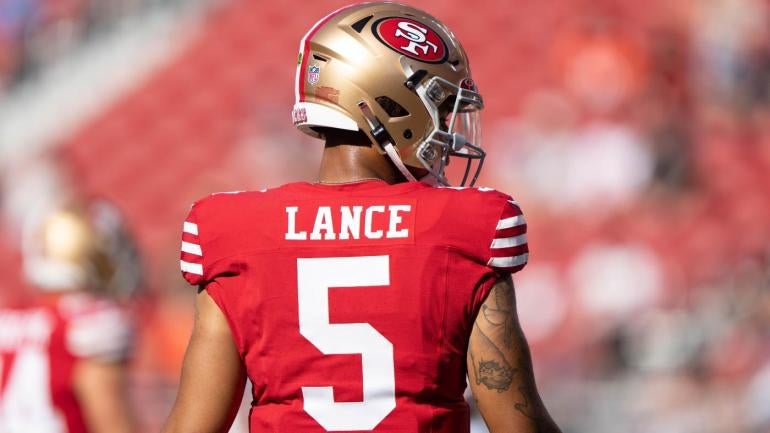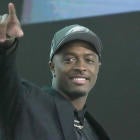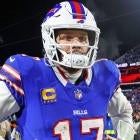
Since the 2016 NFL Draft, a team has traded up in (or into) the first round for a quarterback 14 times. Of those 14 quarterbacks drafted, Josh Allen, Lamar Jackson, Patrick Mahomes, Texans-era Deshaun Watson and Lions-era Jared Goff are the only ones who can be considered a success, and there's plenty of variation in this list – from "game-changing talent" to "good player who elevates those around him."
I mention this because in the months leading up to the draft, particularly as the NFL season winds down and the bad teams jockey for the No. 1 overall pick, there is invariably some conversation about why it is imperative that an organization makes a move for a franchise quarterback.
It's an annual talking point. And annually, after a team does trade up for that franchise quarterback, we all reconvene to discuss why it was, in hindsight, a decision that could set that same organization back years, either because they drafted the wrong quarterback, or squandered valuable draft picks (or current players) or both.
But don't let recent history get in the way of quick-fixing your favorite team. (Hey, I'm as guilty of it as anybody; it's something both fans and front-office folks share: an aversion to losing, and if you're in the front office, a willingness to abandon the three-year plan if there's even the slightest chance of righting the franchise and saving your job.)
The Steelers traded up to No. 10 for LB Devin Bush back in 2019. They should absolutely consider trading up at least that high for a QB in April. They need to quit leaning into the mistakes -- just admit them and move on. Then get a legit OC (turns out, that's important too!). pic.twitter.com/e3V7ncRf35
— ryan wilson (@ryanwilsonCBS) December 19, 2023
"Slightest chance" is the operative phrase above because NFL teams regularly talk themselves into overdrafting quarterbacks, and there is plenty of research that show teams overvalue first-round picks, in general. And when that first-rounder happens to be a quarterback, the most important position on the field, the price to trade up becomes even steeper. Put another way: really smart people can talk themselves into loving a prospect who may have plenty of warts, either on-field, off-field or both.
In 2017, the Bears made a trade with the 49ers to move up one spot, from No. 3 to No. 2, to select quarterback Mitchell Trubisky. The cost? The No. 3 pick in '17, along with a third- and fourth-rounder, and a 2018 third-rounder.
If that feels rich, it's because it is. Those picks became: Solomon Thomas, Alvin Kamara (the 49ers would trade that pick, which eventually found its way to New Orleans), Tedric Thompson and Fred Warner.
Would the Bears be better off now with Thomas, Kamara and Warner? Of course. But none of those players are quarterbacks, nor would they consistently be leading Chicago to deep playoff runs (in the absence of that franchise QB).
Exacerbating matters for the Bears and their fans: that 2017 draft saw the Chiefs trade up from No. 27 to No. 10 for Mahomes, and the Texans trade up from No. 25 to No. 12 for Watson – two examples, though to varying degrees, of draft-day trades that worked out; Mahomes and Andy Reid already have two Super Bowl rings, and before off-field issues derailed Watson's career, he was considered one of the league's best young quarterbacks.
Four years later, the Bears again traded up, this time from No. 20 to No. 11, to draft Justin Fields. Their trade partner, the Giants, got Chicago's 2021 first-rounder (Kadarius Toney), 2021 fifth-rounder (Jamar Johnson), 2022 first-rounder (Evan Neal) and 2022 fourth-rounder (Daniel Bellinger). And while Fields, who is in his third NFL season, is still in the process of proving he's worth keeping around, the Giants didn't exactly win that trade; Toney was a bust and Neal has struggled.
Chicago had the No. 1 pick in the 2023 draft, and instead of targeting another quarterback -- Bryce Young was my QB1, along with many NFL teams -- the team traded down to No. 9, allowing the Panthers to overpay for the right to take Young. And "overpay" may be underselling it by a wide margin, at least at the moment. Young has struggled, in part because the offensive line, the receivers and the running game has been abysmal across the board, but also because it has now become so expensive to move up, especially for a QB.
For the right to draft Young, the Panthers traded wide receiver DJ Moore (now the Bears No. 1 WR), the No. 9 pick (Jalen Carter), the No. 61 pick (Brenton Strange), their 2024 first-rounder (which is likely to be the No. 1 pick) and a 2025 second-rounder. The Bears traded out of the No. 9 and No. 61 picks above, stockpiled more selections, and through 15 weeks of the 2024 season, have had a really good rookie draft class that includes starting right tackle Darnell Wright (Round 1) and cornerback Tyrique Stevenson (Round 2), contributors along the defensive line in Gervon Dexter (Round 2) and Zacch Pickens (Round 4), workhorse running back Roschon Johnson (Round 4) and Tyler Scott (Round 5), a twitchy wide receiver who has a chance to be a solid No. 3 or No. 4 down the road.
Oh, and there's still that '24 first-rounder and '25 second-rounder, not to mention the Bears' own 2024 first-round pick, which is currently the fifth overall selection.
If you ask folks around the league which organization is better set up to succeed in the near term, the answer is Chicago, even if Fields isn't the long-term answer. And you'd think the through line from Trubisky to Fields to whatever fate awaits the Bears atop the 2024 draft would be a cautionary tale for other organizations so desperate for a franchise quarterback they'd be willing to mortgage the future. But I'm guessing that desperation, along with the overconfidence effect and the winner's curse -- when a player's value is overestimated and the "winning" team ends up overpaying to draft that player -- will almost certainly result in several teams trading up in next April's draft.
Collectively, we'll all talk ourselves into Caleb Williams or Drake Maye or Jayden Daniels being the next Mahomes or Trevor Lawrence or Jackson, even if the reality is that they're much more likely to be replacement-level than elite.
This is where I point out that there were a lot of questions about Mahomes coming out of that Air Raid offense at Texas Tech; Lawrence has been good but not great through almost three seasons; and Jackson was the fifth quarterback taken in the 2018 class, behind Baker Mayfield, Sam Darnold, Allen and Josh Rosen.
And something else to keep in mind; the Ravens traded back into the first round, to No. 32, to select Jackson. And all it cost them was a 2018 second-rounder (that became Kemoko Turay), a 2018 fourth-rounder (Avonte Maddox) and a 2019 second-rounder (Miles Sanders). (Baltimore also got a 2018 fourth-rounder as part of the trade and selected Jaleel Scott). Which is another example of what the research from Cade Massey and Richard H. Thaler has shown: picks near the end of the first round or early in the second round have more value, when you also include the financial costs, than a high first-round pick.
So what does this all mean for the 2024 NFL Draft?
For starters, the Bears are in an enviable position. They can keep Fields for Year 4, hopefully bring in an offensive coordinator to get the most out of his abilities, and trade out of the likely No. 1 overall pick, accumulate many more picks in return – one that hopefully would include Ohio State wide receiver Marvin Harrison Jr., and then continue to restock the roster through both the draft and free agency (the Bears currently have $63.8 million in available cap space in 2024, according to Over the Cap, which ranks seventh in the league).
The Bears could also choose to move on from Fields, who still has one more year on his rookie deal, plus the fifth-year option. It's not unreasonable to think that he'd be worth a second-round pick which, again, means more draft capital and now Chicago could take Williams or Maye or whomever their QB1 ends up being.
Things get interesting, however, if the Bears trade out of the top spot for the second-straight year. As we sit here, the draft order for the top 18 teams -- those out of the playoffs -- includes 12 teams that could be in the market for a quarterback. There are not 12 first-round-caliber quarterbacks in this class. And even if there were, the success rate for first-round QBs is remarkably low -- and only one of the 38 QBs drafted in Round 1 from 2011-2022 has led his team to a Super Bowl (Mahomes).
Williams, Maye, Daniels, Michael Penix Jr. and J.J. McCarthy all have a chance to go in Round 1 (and we could see another name or two find their way into the conversation), which means that demand will outstrip supply. It also means that desperate teams will overpay to get one of these QBs, especially when you factor in owners looking for new coaches and/or GMs (or could be soon), in part because the current quarterback situation has not worked out.
The Patriots, Commanders, Jets, Falcons, Raiders, Saints and possibly the Bears could be in that situation, while the Cardinals, Giants, Broncos, Seahawks and Steelers appear to have more stability at coach and general manager, but also could be in the market for a quarterback.
But here's something I keep coming back to, especially in light of what history tells us about the perils of trading up for a QB: take a look at the teams currently among those headed to the playoffs, specifically, the quarterback and their play caller.
In the AFC, you have Jackson and Todd Monken, Mahomes and Reid, Tua Tagovailoa and Mike McDaniel, Lawrence and Doug Pederson, Zac Taylor and Jake Browning, Shane Steichen and Gardner Minshew, and even what Kevin Stefanski has done with four different QBs in Cleveland.
In the NFC, you have Brock Purdy and Kyle Shanahan, Dak Prescott and Mike McCarthy, Goff and Ben Johnson, Baker Mayfield and Dave Canales, Kirk Cousins/Josh Dobbs/Nick Mullens and Kevin O'Connell and Matthew Stafford and Sean McVay. (I didn't include Jalen Hurts and Brian Johnson here because that offense has sputtered since Steichen left to take the Colts job following the '22 season.)
Yes, every AFC team has (or at one time this season, had) a first-round QB, and three NFC teams currently start a first-rounder under center, but the bigger, more important takeaway for me is that they have been paired with an elite play caller. Someone who consistently puts them and the offense in position to succeed.
(And we can certainly include those teams currently battling for one of the final playoff spots too – C.J. Stroud and Bobby Slowik in Houston, Allen and Joe Brady in Buffalo, and Geno Smith Shane Waldron in Seattle.)
So, yes, using a high first-round pick on a quarterback can feel like a necessity, but finding the right coordinator is arguably just as consequential. That said, I fully expect the Bears to field plenty of offers from interested, desperate teams looking to trade up -- and trade the farm -- for an opportunity at that franchise quarterback.
*All trade data via Pro Sports Transactions
YEAR | TRADE DETAILS | QB SELECTED AFTER TRADE UP |
2023 | PANTHERS trade D.J. Moore, 2023 first-round pick (#9-Jalen Carter), 2023 second-round pick (#61-Brenton Strange), 2024 first-round pick (TBD), 2025 second-round pick (TBD) to the BEARS for 2023 first-round pick (#1-Bryce Young) | Panthers take Bryce Young No. 1 overall |
TITANS trade 2023 second-round pick (#41-B.J. Ojulari), 2023 third-round pick (#72-Garrett Williams), 2024 third-round pick (TBD) to the CARDINALS for 2023 second-round pick (#33-Will Levis), 2023 third-round pick (#81-Tyjae Spears) | Titans take Will Levis No. 33 overall | |
2021 | 49ERS trade 2021 first-round pick (#12-Micah Parsons), 2022 first-round pick (#29-Cole Strange), 2022 third-round pick (#102-Channing Tindall), 2023 first-round pick (#29-Bryan Bresee) to the DOLPHINS for 2021 first-round pick (#3-Trey Lance) | 49ers take Trey Lance No. 3 overall |
BEARS trade 2021 first-round pick (#20-Kadarius Toney), 2021 fifth-round pick (#164-Jamar Johnson), 2022 first-round pick (#7-Evan Neal), 2022 fourth-round pick (#112-Daniel Bellinger) to the GIANTS for 2021 first-round pick (#11-Justin Fields) | Bears take Justin Fields No. 11 overall | |
2020 | PACKERS trade 2020 first-round pick (#30-Noah Igbinoghene), 2020 fourth-round pick (#136-Brycen Hopkins) to the DOLPHINS for 2020 first-round pick (#26-Jordan Love) | Packers take Jordan Love No. 26 overall |
2018 | JETS trade 2018 first-round pick (#6-Quenton Nelson), 2018 second-round pick (#37-Braden Smith), 2018 second-round pick (#49-Dallas Goedert), 2019 second-round pick (#34-Rock Ya-Sin) to the COLTS for 2018 first-round pick (#3-Sam Darnold) | Jets take Sam Darnold No. 3 overall |
BILLS trade 2018 first-round pick (#12-Vita Vea), 2018 second-round pick (#53-M.J. Stewart), 2018 second-round pick (#56-Duke Dawson) to the BUCCANEERS for 2018 first-round pick (#7-Josh Allen), 2018 seventh-round pick (#255-Austin Proehl) | Bills take Josh Allen No. 7 overall | |
CARDINALS trade 2018 first-round pick (#15-Kolton Miller), 2018 third-round pick (#79-Rasheem Green), 2018 fifth-round pick (#152-Dane Cruikshank) to the RAIDERS for 2018 first-round pick (#10-Josh Rosen) | Cardinals take Josh Rosen No. 10 overall | |
RAVENS trade 2018 second-round pick (#52-Kemoko Turay), 2018 fourth-round pick (#125-Avonte Maddox), 2019 second-round pick (#53-Miles Sanders) to the EAGLES for 2018 first-round pick (#32-Lamar Jackson), 2018 fourth-round pick (#132-Jaleel Scott) | Ravens take Lamar Jackson No. 32 overall | |
2017 | BEARS trade 2017 first-round pick (#3-Solomon Thomas), 2017 third -round pick (#67-Alvin Kamara), 2017 fourth-round pick (#111-Tedric Thompson), 2018 third-round pick (#70-Fred Warner) to the 49ERS for 2017 first-round pick (#2-Mitchell Trubisky) | Bears take Mitch Trubisky No. 2 overall |
CHIEFS trade 2017 first-round pick (#27-Tre'Davious White), 2017 third-round pick (#91-John Johnson), 2018 first-round pick (#22-Rashaan Evans) to the BILLS for 2017 first-round pick (#10-Patrick Mahomes) | Chiefs take Patrick Mahomes No. 10 overall | |
TEXANS trade 2017 first-round pick (#25-Jabrill Peppers), 2018 first-round pick (#4-Denzel Ward) to the BROWNS for 2017 first-round pick (#12-Deshaun Watson) | Texans take Deshaun Watson No. 12 overall | |
2016 | RAMS trade 2016 first-round pick (#15-Corey Coleman), 2016 second-round pick (#43-Austin Johnson), 2016 second-round pick (#45-Derrick Henry), 2016 third-round pick (#76-Shon Coleman), 2017 first-round pick (#5-Corey Davis), 2017 third-round pick (#100-Jonnu Smith) to the TITANS for 2016 first-round pick (#1-Jared Goff), 2016 fourth-round pick (#113-Nick Kwiatkoski), 2016 sixth-round pick (#177-Temarrick Hemingway) | Rams take Jared Goff No. 1 overall |
EAGLES trade 2016 first-round pick (#8-Jack Conklin), 2016 third-round pick (#77-Daryl Worley), 2016 fourth-round pick (#100-Connor Cook), 2017 first-round pick (#12-Deshaun Watson), 2018 second-round pick (#64-Tyquan Lewis) to the BROWNS for 2016 first-round pick (#2-Carson Wentz), 2017 fourth-round pick (#139-Jehu Chesson) | Eagles take Carson Wentz No. 2 overall | |
BRONCOS trade 2016 first-round pick (#31-Germain Ifedi), 2016 third-round pick (#94-Nick Vannett) to the SEAHAWKS for 2016 first-round pick (#26-Paxton Lynch) | Broncos take Paxton Lynch No. 26 overall |
















